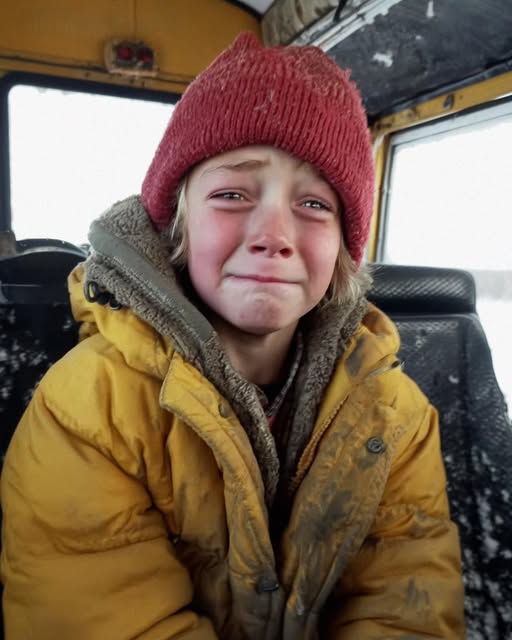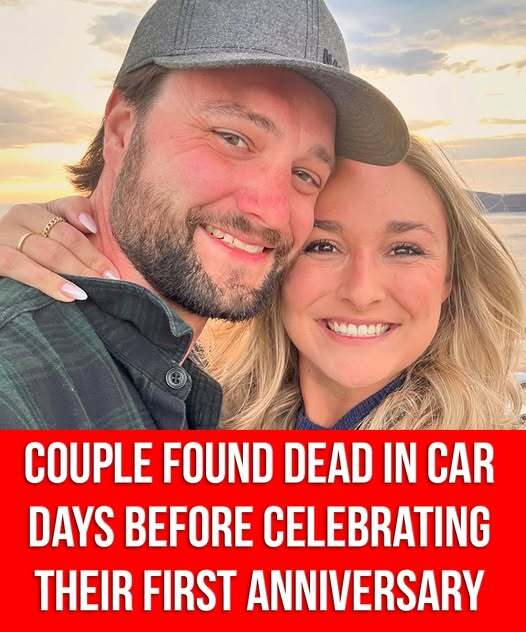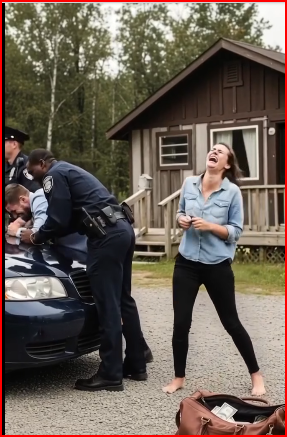That morning was the kind of cold that makes you question your life choices. The frost had crawled up the windows overnight, and the air bit through my gloves before I even got the bus door open. But what stopped me cold wasn’t the weather. It was the sound of a quiet sob coming from the back of the bus.
My name’s Gerald. I’m 45, and I’ve been driving a school bus in our little Midwestern town for over fifteen years. It’s not glamorous work, but it’s good, honest, and the kids make it worth it. They’re loud, messy, hilarious — and on most days, they make me forget the world outside those yellow walls.
That morning started like any other. I showed up early, got the heater running, and watched the first wave of sleepy kids stumble up the steps in their puffy coats and backpacks bigger than they were. I cracked a few jokes to keep spirits up. “Hustle up, kids, or I’ll freeze into a bus popsicle!”
They laughed, rolled their eyes — the usual.
But after the last drop-off, when the bus emptied out and the chatter faded, I heard it. A soft, muffled crying from the back.
“Hey there?” I called, walking down the aisle. “Someone still here?”
There, tucked into the far corner, was a boy I hadn’t noticed before. Maybe seven or eight years old. He was huddled against the window, trying to make himself small, his coat zipped to the chin. His backpack sat untouched on the floor.
“Buddy, you okay?” I asked gently.
He sniffled but didn’t look up. “I’m just cold,” he whispered.
Something in his voice made my chest tighten. I crouched down. “Can I see your hands?”
He hesitated, then slowly pulled them out from his sleeves. My stomach dropped — his fingers were pale and blue at the tips, cracked and swollen. Not from a few minutes of cold, but from going without proper gloves for days.
“Good Lord,” I muttered under my breath. I tugged off my own gloves and slipped them over his hands. They were too big, but it didn’t matter. “Here, these should help for now.”
He looked at me, eyes wide and wet. “I’m not supposed to take things.”
“Then think of it as borrowing,” I said. “You can pay me back someday by doing something kind for someone else.”
He nodded slowly. “Mommy and Daddy said they’ll get me new gloves next month. Daddy got hurt at work. He’s trying.”
I swallowed hard. “Well, your dad sounds like a good man. But until then, you’ve got mine.”
The boy smiled — a small, shaky smile that said more than words ever could. When we pulled up to school, he gave me a quick hug before running off.
That should’ve been the end of it. But as I sat there, watching him disappear through the doors, something inside me shifted.
That afternoon, instead of heading home, I stopped by a small local shop owned by a woman named Janice. She’s one of those people who’s been around forever — knows everyone’s name and everyone’s business.
“Need a favor,” I told her. I explained the situation, and she helped me pick out a sturdy pair of children’s gloves and a warm scarf — bright blue, superhero-style. I used my last twenty to pay for them.
Back at the bus, I found an empty shoebox and wrote on the lid: If you’re cold, take something from here. — Gerald. I tucked the box behind my seat and left it at that.
I didn’t make an announcement. I didn’t want attention. I just wanted kids to know they could quietly take what they needed.
The next morning, I saw a small hand reach for the box as the kids boarded. It was the same boy. He didn’t say a word, but when he got off at school later, he looked back at me with a grin that said everything.
A week later, the principal called me into his office. My heart sank. I figured someone had complained. Instead, he smiled. “You didn’t do anything wrong, Gerald. In fact, you did something wonderful.”
He told me the boy’s name was Aiden. His father, Evan, was a firefighter who’d been injured in the line of duty and hadn’t been working. The family had been struggling. What I’d done, he said, had meant the world to them.
Family games
Then he slid a document across the desk. “We’re starting a program — The Warm Ride Project. A fund for winter clothes for kids who need them. It was inspired by your little box.”
I didn’t know what to say. I just sat there, blinking like an idiot, trying not to get emotional.
Within a week, word spread. Parents started dropping off coats and hats. A local bakery donated new mittens. Janice, the shop owner, called and said she’d supply gloves every month. The shoebox on my bus turned into a full donation bin.
By Christmas, there were bins in every school bus in the district.
Kids began leaving little notes when they took something. “Thanks, Mr. Gerald, I can play outside again.” “The red scarf is really warm — you’re awesome.” I taped those notes above my dashboard and looked at them every morning before starting the engine.
Then, just before winter break, a woman approached me in the parking lot. She was in her thirties, neat and composed. “You must be Gerald,” she said. “I’m Claire — Aiden’s aunt.”
She thanked me, saying how much it had meant to her family. Then she handed me an envelope. Inside was a thank-you card and a gift card for $200. “Use it however you want,” she said. “But I think I know what you’ll do with it.”
She was right. I bought more gloves.
In the spring, the school invited me to an assembly. I assumed it was for the kids, but halfway through, the principal called my name.
“Today,” he said, “we honor someone whose small act of kindness grew into something beautiful.”
The room erupted in applause. I walked to the stage, feeling completely out of place, and then I saw them — Aiden and his dad, Evan, standing in the front row. Evan was back on his feet, still limping slightly, but with pride written all over his face.
He came up to me, shook my hand, and said quietly, “You didn’t just help my boy. You helped me believe again.”
I didn’t have words. Just tears.
Afterward, Aiden gave me a drawing — a picture of me standing in front of the bus surrounded by smiling kids wearing colorful scarves and gloves. At the bottom, he’d written: Thank you for keeping us warm.
I taped it beside the steering wheel, where it’s stayed ever since.
That picture reminds me every day that kindness doesn’t need an audience. It doesn’t need applause. It just needs someone to notice — and to act.
I used to think my job was to drive kids from home to school and back again. But now I know it’s about something bigger. It’s about seeing people. It’s about one moment of compassion that turns into hundreds.
All it took was a boy with blue hands and a man with an old pair of gloves.
And from that, a whole town learned how to keep each other warm.



